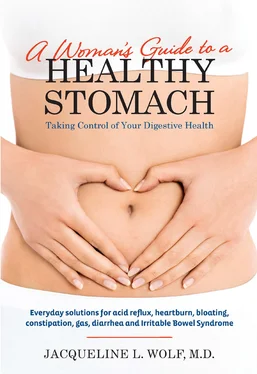Today she says she feels a million times better. “After seeing Dr. Wolf, my symptoms didn’t get better overnight, but at least emotionally, I felt that finally somebody was taking me seriously and not just writing me off as a hypochondriac. She started me on a set of medications to help me reduce my symptoms so that my daily life is not torture. My cramps used to be so bad, I’d break into a cold sweat. I couldn’t talk. I’d be balled up in the corner of the cardio area in the gym for hours. Now that’s not quality of life. But now it [the pain] is not that extreme. I feel a lot less embarrassed about being outside and being around people. I can function.” In fact, she’s now trying to finish her degree, and she hopes to get pregnant. “Instead of IBS managing me, I’m managing it,” she told me at our latest meeting.
What is IBS?
Irritable bowel syndrome (IBS) occurs in about 14 to 25 percent of women, although most people with symptoms do not consult a physician and suffer in silence, due to shame or being told that they’re overreacting. IBS also mimics many other issues, like endometriosis, so it’s difficult to pinpoint right away. Elizabeth had a particularly bad and chronic case of IBS. Women are twice as likely to get IBS as men, and many of these women have suffered abuse, just like Elizabeth had. Symptoms vary and are sometimes confused with those of inflammatory bowel disease (ulcerative colitis or Crohn’s disease), which is a physical disruption or abnormality in the intestines that causes inflammation or damage to the bowel. With IBD, an X-ray, colonoscopy, endoscopy and so forth will show an abnormality; but with IBS they won’t. IBS is a syndrome, not a disease.
The diagnosis of this syndrome is based on symptoms. There’s no study that determines IBS; rather, the absence of abnormal X-rays and colonoscopy tests points to an IBS diagnosis. The diagnostic criteria have changed over the years but have always consisted of recurring abdominal pain and a change of bowel function—constipation, diarrhea or alternating constipation with diarrhea. Ask yourself this: Have you had recurrent abdominal pain or discomfort for three or more days per month? Has this been going on for at least the past three months? Does going to the bathroom help? Have the stools changed in frequency or form? And what about gas? Have you got it? If you have pain with the stool changes, you might have IBS.
Who gets IBS?
Those with a low quality of life are more likely to be afflicted because IBS may have a negative impact on one’s overall well-being. Several psychological factors and childhood rearing practices have been reported to increase the risk of IBS. One study suggests that IBS in children is more common if the mother paid a lot of attention to complaints of illness and if children had many absences from school. A child with a parent or a twin with IBS is also more at risk for developing IBS due to genetic factors. Identical twins have a greater risk for developing IBS than nonidentical twins when one twin is diagnosed with the condition. The development of new onset IBS is associated with frequent visits to doctors, anxiety, sleep problems and somatic complaints (physical complaints, like aches, where the cause can’t be found). Sometimes IBS crops up in the wake of a viral or bacterial infection; in this case, diarrhea is more likely to occur than constipation.
Some gut infections are more likely to cause IBS than others. After an infection with Campylobacter jejuni, a bacterial infection that comes from food poisoning from eggs and poultry, the risk of developing IBS is as much as 13 percent. It occurs less after Salmonella infections. But if you get antibiotics for your Salmonella infection, your risk almost doubles to over 17 percent, according to one study, which is why Salmonella usually isn’t treated, except in the very young or elderly. Factors that increase the risk of developing IBS after an infection are being female, being younger than sixty, increased duration and (probably) intensity of the infection, psychological factors such as anxiety and depression, and smoking. Sometimes IBS is brought on by stress. Remember, your gut is hypersensitive and feels stress acutely. This is one way that it reacts.
What are the symptoms of IBS?
Without abdominal pain or discomfort, you don’t have IBS! The pain or discomfort has to recur at least three days per month for three months in a row and also has to persist for six months. Secondly, the pain or discomfort has to be relieved by a bowel movement or be associated with a change in stool frequency (for you), or a change in stool appearance or form. This can be an increased or decreased frequency of stool or such changes in the stool as watery or mushy, hard, incompletely evacuated or requiring straining to evacuate. Bloating, gas and frequent urination, as well as the urgent need to urinate, are associated with IBS. Fibromyalgia and depression are also common in those with IBS. IBS is divided into subtypes, which are usually treated differently. These are constipation, diarrhea, mixed pattern (alternating between diarrhea and constipation) and undetermined. The constipation subtype is much more common in women, while the diarrhea subtype occurs equally in men and women.
Many women will tell you, though, that gas is their worst and most humiliating symptom. It’s present in women with IBS 72 percent of the time.
My doctor asks me to describe my stool. I barely want to even look at it, let alone describe it!
Knowledge of the form your stool takes helps your doctor make an assessment about what might be happening in your intestines. A scale, dubbed the Bristol Stool Form Scale, has been developed just for this purpose. This scale helpfully describes seven major consistencies and shapes of stool, from little pieces (pebbles, rabbit droppings) to mush or liquid, so we doctors don’t have to grope for vivid descriptions! Type 1 and 2 are hard to pass and occur with constipation. Type 3 and 4 are normal in the sense that they are more easily passed. Type 5 and 6 are soft and may come out with more force, and type 7 is diarrhea. Be sure to tell your doctor if your stool is bloody, that is, if blood is present either on the toilet paper or in the toilet, or is mixed in with the stool.
Figure 3-1. This chart shows the different types of stool form. Types 1 and 2 are hard to pass and are seen with constipation. Types 3 and 4 are considered normal (and ideal, by some people). Types 5 and 6 tend toward diarrhea. Type 7 is definite diarrhea with liquid and no form.
Can I get tested for IBS?
First things first: All women over age fifty and African-Americans women over age forty-five should have a colonoscopy to make sure there are no polyps or cancer. No matter what her age, any woman with unexplained rectal bleeding should have a colonoscopy to make sure there are no polyps, cancer or inflammation. Sorry, though, there are no accurate blood tests to make the diagnosis of irritable bowel syndrome. However, new blood tests have been developed to identify markers of substances (biomarkers) in the blood that are associated with irritable bowel syndrome. If there is a high suspicion of IBS and the test panel is positive—the tests have good predictability. Conversely, if there is a low suspicion of IBS and the test panel is negative, again, the test has good reliability. But if IBS is suspected and the test panel is negative, well, you still might have it.
Unfortunately, there are large numbers of people having these tests who could be overlooked and who do have IBS, or who are incorrectly told they have IBS. The blood tests sometimes used for diagnosing IBS include ones that are useful in making the diagnosis of celiac disease and inflammatory bowel disease; people with IBS could be told they have one of these other conditions. Other tests—such as stool cultures; routine blood tests looking for anemia or high white blood cell counts, which could indicate an infection or an inflammatory process; X-rays; or endoscopic tests—are useful in ruling out other conditions. However, for most people under fifty, they’re not usually necessary. Celiac sprue (gluten allergy) (see Chapter 4) can be discounted by doing a blood test called tissue transglutaminase antibody.
Читать дальше












